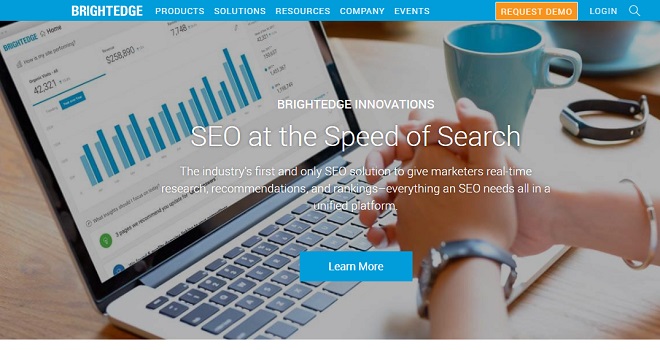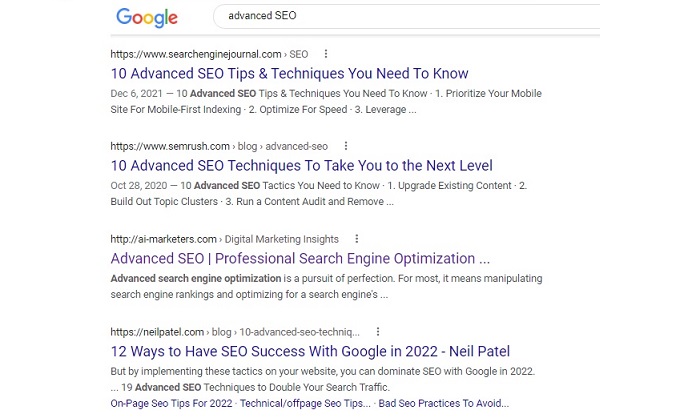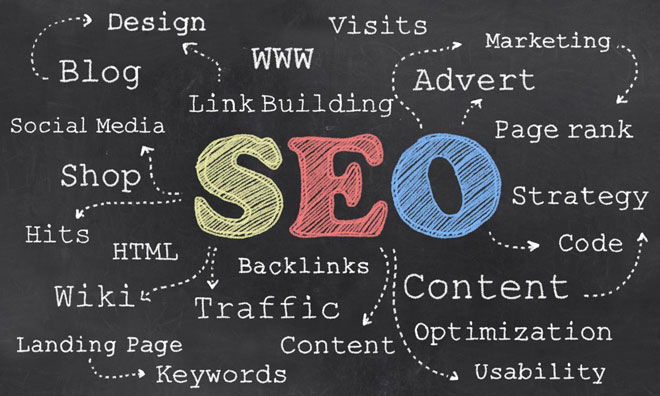Should You Use Search Engine Optimization Platforms?
Are you under some pressure to power up your visibility and rankings on Google? Everyone is, including marketing agencies! Your advanced SEO consultant or SEO company may rely on some tools to help speed creating the results you need. Do any of them actually create anything valuable?
The SERPs are competitive and the question is: will a SEO marketing platform make a difference for your company? Or is SEO so creative and diverse that these tools can’t rid you of difficult time consuming tasks?
That leads us to the other question of whether you’re better to hire an SEO expert and leave the hard work to them?
If you’re at this point in your journey, you can review the major SEO platforms and new AI SEO software solutions. And you might consider hiring an SEO consultant to advise or an SEO/Content expert to execute an elite level campaign for you. Software solutions are definitely cheaper than SEO fees, but you’ll be doing the work and you’ll have to achieve expert level results.
What is an SEO Platform?

As I explained in my posts on AI marketing software, a platform is a full suite of integrated apps or tools. Often, marketing managers and small business people subscribe to them without even knowing their potential. Typically, they don’t have a game plan or strategy to rank well and they may think the software will fulfill the needs of the marketing campaigns.
SEO platforms won’t plan or conduct an expert SEO level project. They’re an aid. Some SEO experts/consultants don’t rely on these platforms. Some of the best SEOs focus on user intent, keyword research, high quality content, and a creative mapping of content in the website they’re optimizing. A lot of this high level work is beyond automated tools.
Do SEO Experts Use Them?
Experts perform SEO with a quiet, big picture confidence. They’re secure in the knowledge that if they have a solid long term optimization plan, build high quality engaging, impactful, shareable, and linkable content, that the high rankings will come.
They don’t want a platform as a warrior tool chest to slay the competition. Experts often feel the battle is won at the top, creative, well informed and planned, and consistently applied.
But hold on, sometimes these search engine optimization tools can offer a lot of insight. The benefit might go well beyond SEO to analytics, content design, and paid advertising optimization. So why don’t we right now, take an inventory of all the benefits that may accrue from a good quality, comprehensive SEO Software platform.

Why Buy SEO Software Platforms?
-
- Credibility and Influence: Search engine optimization pros have little power or influence in client or department hierarchies. Therefore, good tools can improve their ability to influence. Managers want hard numbers and better insight. Your ability to use analytics can determine your political success. I’ve been in this circumstance so many times. Powerful analytics is essential to gaining senior executive support.
- Automation: By automating tasks such as rank monitoring, keyword research, audits, creating reports, backlinks monitoring, and more, you’re taking some of the tedious work off of your hands. The time you save lets you focus more on building high quality content that matches user intent.
- Add to Your Capabilities: The apps and dashboard help you achieve a better level of competence and productivity. Add in Artificial intelligence apps, and these systems might be very informative, timely, and effective.
- Belief in Technical SEO: Oh yes, the specter of technical errors on your site and meta tag optimization. Well, if you’re running Yoast on WordPress and have a reliable web developer, you might avoid a lot of these errors. If the software’s diagnostic services can find real, actual errors, it could indeed help Google to spider your site correctly.
- Better Control: You want better control over the chaos that is organic content optimization. Up until now, all SEO work was performed in an asynchronous, almost haphazard fashion. If you can’t visualize what you’re doing or get focused in your work, your work will suffer. Yes, controlling your time and optimizing optimizing performance through design is important.
- Measure and Improve Current Performance: Analytics solutions tell you how you’re doing against established benchmarks. SEO is creative and it’s not easy to find benchmarks. The software however can give you a rough guide of progress, and provide reports on specific objectives (e.g., establishing your site’s key producing pages and determining the dollar value of landing pages).
- Monitor Rankings: one of the first services offered by SEO software. What are you ranking on, what could you rank on next, and how are competitors doing? Rankings are the currency of SEO.
- Site vs Site Comparison: If you have one or two key competitors, some platforms will allow you to compare your site to each. Metrics such as rankings, traffic, core keywords, content topics, title tags, anchor text, and backlinks can help you understand why they’re successful.
- Monitor and Learn from Competitors: Some believe you shouldn’t compete against the market, but instead focus on your own unique value proposition, positioning, and creating an inimitable brand. That would eliminate competition and give you a monopoly. It worked for Google. However, it’s wise to keep an eye on the market and watch competitors changing tactics and response to Google algorithm updates. Better to be aware of threats and opportunities in the market.
- Accelerate Learning: Yes, these tools can help accelerate your learning about search engine optimization, content strategy, lead funnel optimization, and even social media strategy. Particularly, with AI marketing platforms, you can test, learn, and update. In fact, a lot of SEO work is hacking better rankings on hundreds of keywords. All of your traffic won’t come from a few high volume core keywords. That’s the challenge of pro level SEO.
- Look More Professional: An accountant or financial advisor needs analytics and reporting tools to help them focus on client’s key issues, report results, and prepare a new strategy. Same for SEO. Although you know your stuff, your clients, investors, and managers don’t. For them, seeing is believing and they want to see real data and have it explained to them quickly.
- Produce Better Reports for Clients: While standardized SEO reports are informative, the real deep and granular reporting is often done manually. And this is often because the SEO analytics tools aren’t comprehensive enough to report on such important details. Let’s say you wanted the dollar revenue value for the last 6 months for all keywords that contained the word “SEO?” Or what the topic, graphic or video was in your top landing page during one week where you traffic quadrupled? The thing is, standard information doesn’t really tell clients what actually caused something to happen. That’s what they want to know.
- Keyword Information: Some of the solutions started out as keyword reporting tools. They evolved to provide extensive data on CPC prices, monthly volumes, competitive difficulty, and more. It’s wise to use the tools to identify short term, medium term and long term keyword phrase targets. As part of your research you must understand the searchers intent when they use those keywords. This guides your content writing.
- Find Content Ideas and Gaps: some tools such as ahrefs can help you find topics not well covered on the top ranking websites. That content might be relevant to Google, so you might get an edge if you have it on your page or site.
- Find Backlinks: Most top SEO platforms spider the web to follow all the links to your site and your competitors. Backlinks are important especially those unmarked or marked with do follow tags. Examining where competitors get their backlinks from can help you in your outreach and link building efforts.
- Conducting SEO Audits: Performing a high quality SEO audit is exhausting. I’ve done many of them. Having a report automated is heaven. You can add in your own key insights.
- Measure Visibility: Understanding how visible your site is on the web and social media can help you report how you’re helping build brand, as well as positioning your pages for higher rankings. Google console tools indicates how many times your listing appeared in the results. It’s one KPI that tells of future performance.
- Becoming More Aware of What the Data is Telling You: The data and reports help you understand what is going on in a big picture sense (e.g., should you push more for your core keywords, or venture into new topics?, or what is it about your search results and content that’s not creating leads and revenue?).
- More Granular Insight: By assessing each keyword phrase performance, or core keywords in long tail searches, you get closer to what is really driving revenue. What content is actually generating a hot lead? You’ll need funnel optimization software too, but SEO ties into everything: sales, content strategy, analytics. It’s those fine insights that will help you make search traffic convert better.
- Track Specific Pages: why are your top ranking and landing pages performing so well? How are rankings, visibility, and content changes affecting engagement and revenue? Your sales, analytics, and funnel optimization apps will offer a big help in this regard.
- See Trends in Rankings Over Time: Rankings take time, so you’ll want to know when a jump or fall happened and what caused it. Trend watching in rankings, traffic, engagements, and revenue help you in your growth hacking pursuits.
- Track Long Tail Success Over Time: don’t just track your top head keywords. The long tail is a universe of keywords that generate brand awareness and leads. Tracking any word within them and estimating its revenue value is very important to your company. Know specifically what is causing leads and revenue.
- More than Google Console: Google console and analytics are helpful, but they don’t help you specify what created a high ranking, engaged them, brought people through your conversion funnel, or created a sale. For that, you need the tools I introduce on this site.
- Focus on Content Quality and User Intent: Time, energy and focus are assets you need to manage well. With more time and energy, you can focus on your audience’s intent when typed keywords in and when they arrive on your site. If visitors leave or bounce, you need to understand why. In the end, your fate is controlled by engagement, customer satisfaction, and sales revenue. High rankings are wonderful, but it takes more to create a real customer.
- Aid in Designing Personalized Content: The trend is to a personalized customer journey. And new AI content personalization software factors into site success, and even SEO success. Personalization aids engagement and sales conversion, and reduces bounces which will lower your rankings.
- Aid in Improving Content Paths and Funnel Conversion: SEO and content strategy have to work together, since Google’s content experience is the same as visitors. Generally, excellent content flow should aid your rankings. Google is getting better at assessing the quality of your conversion funnel.
- Determine ROI for Keywords and Content Pieces: just as with your PPC campaigns, your Google and Bing search traffic has a dollar value. Being able to apply and end dollar value to each keyword is vital to your SEO and content strategy.
- Optimize SEM Performance and Glean Insight from it: Your PPC campaigns are often keyword and content driven. The data from them can help you identify the high priced keywords and build more content in support of them.
- Support other Marketing Software: Other tools, apps, and plugins can benefit from being integrated into the SEO solutions.
- Integration with AI Marketing Solutions: Yes, the era of AI marketing is here. If your solution’s data can plug into one of the top AI marketing, AI content creation tools, or AI Sales platforms, you can begin optimizing for the customer journey and funnel optimization. Personalized content is the next challenge for SEO.
Sustainable Value and Opportunity
It’s the cost of SEO Software Platforms, AI SEO software, marketing software platforms, Funnel Analytics solutions, and CRM sales platforms that’s holding most small businesses back. It’s a very unfair playing field so you’ll need to choose the solution that will help you with your greatest weakness, and greatest opportunity.
I still like to think SEO and Content Strategy are the greatest opportunity. Trillions of searches to capture and top visibility in your sector. There’s a lot of value here, especially bottom line dollar value.
The SEO software you try whether it’s ahrefs, Moz, Semrush, Spyfu, etc., isn’t the panacea you might think. SEO and content strategy are very creative and the tools might not be subtle enough to optimize them.
These systems can take up some of your time and money, and you’ll still be doing more intense optimization work. But if you’re achieve much better results, it has to be worth it.
An SEO Consultant Creates a Lot of Value
If it’s too much for you, you can always hire a seasoned SEO consultant and be done with the problem. If SEO isn’t really your thing, that might be the right choice. Success comes with our passion for our work and good tools.
SEO Company | AI Marketing Tools | Marketing Software | AI Marketing | SEO Services | AI SEO Software | AI Marketing Analytics | SEO Software Platforms | AI Predictive Analytics | Marketing Services Toronto | Marketing Services Boston | Marketing Agency in Bay Area | Marketing Service San Diego | Why Use AI Software? | What is AI Marketing? | AI Stock Forecasting | Software Marketing Solutions | AI Writing Software | AI Marketing Agency







